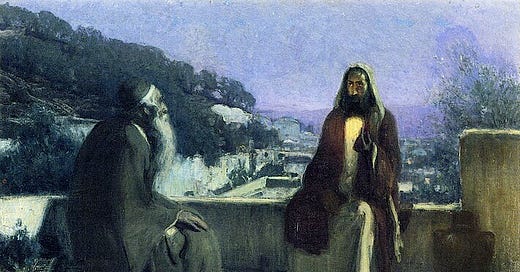It is incredible how, no matter how many times you read them, the Passion narratives still produce little details every Holy Week that you’ve never noticed before, or which catch you by surprise. I wrote on one such detail last year—the joke sceptre given to Christ in mockery by the Roman soldiers, and how it relates to the prophecies of Genesis 49.
This year, I was reminded of a little quirk in John’s crucifixion account: the reappearance of Nicodemus.
38 Later, Joseph of Arimathea asked Pilate for the body of Jesus. Now Joseph was a disciple of Jesus, but secretly because he feared the Jewish leaders. With Pilate’s permission, he came and took the body away. 39 He was accompanied by Nicodemus, the man who earlier had visited Jesus at night. Nicodemus brought a mixture of myrrh and aloes, about seventy-five pounds.[e] 40 Taking Jesus’ body, the two of them wrapped it, with the spices, in strips of linen. This was in accordance with Jewish burial customs. 41 At the place where Jesus was crucified, there was a garden, and in the garden a new tomb, in which no one had ever been laid. 42 Because it was the Jewish day of Preparation and since the tomb was nearby, they laid Jesus there.
John 19:38-42 (NIV)
Nicodemus is unique to John’s Gospel. Famously, he appears in John 3, portentously visiting Jesus under cover of darkness—a religious leader with a reputation at stake, it seems.
I thought on Nicodemus a good bit earlier this year, as our church preached through John. Perhaps it is getting older, but I heard something different and more compassion-inducing in his infamous question, “how can a man be born again when he is old?” I wrote a short poem inspired by that passage—a passage which seems to be redeemed by by what we later read in John 19 (with another brief appearance for Nicodemus along the way in John 7)
In honour of the celebration of the death of our Lord on this Good Friday, I offer that poem below, free to all my readers. I will share another poem on the resurrection on Sunday.
Nicodemus
His ageing knowledge, all accrued
without interest. He had pursued
all questions on the lips of youth,
debated each, exhausting truth
in litigation. Now unawed.
The teacher of God-wrestlers: bored.
So when he hears himself ask “how?”,
with some movement of scholar’s brow,
he cannot tell what tone he hears—
the first fresh thought for forty years
or honed and hollow quip? That voice
could be the novel birth of choice
or dead worn groove of will deferred.
Unknown to him is his own word.






Love it. A good word for readers and thinkers and scholars and teachers. Thank you.